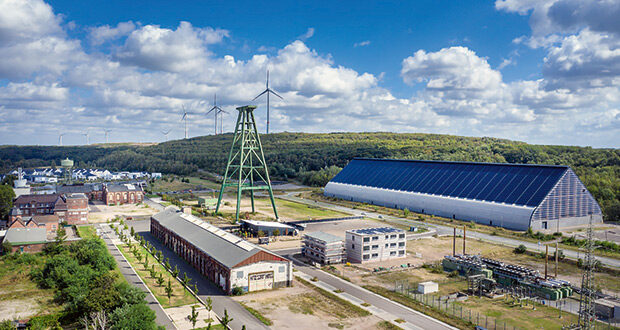“Despite corona, RAG managed to meet or exceed all its business goals” says Peter Schrimpf, Chairman of the RAG Board of Management. Indeed, with regard to the funds to finance the so-called perpetual obligations by the RAG-Stiftung, the RAG Aktiengesellschaft, Essen/Germany, will use slightly less for 2021 than originally planned. The perpetual obligations include minewater management, ground water purification and polder measures. In 2020, funds were approximately 290 € M, the largest proportion reserved for mine water management.
By the end of 2021, RAG had about 750 active employees. At the end of the previous year, there were around 1,240. Schrimpf: “Even with the necessary reduction in staff, we are still on track.” This year, an agreement has been reached with almost all 140 miners who, despite various job offers, did not want to change and filed a suit regarding the compulsory redundancies. Schrimpf: “Since 1997 alone, RAG has cut over 80,000 jobs, all, without exception, in a socially responsible manner – not only with the help of the early retirement scheme, but also by transferring people from one job into another. A unique process in the Federal Republic of Germany.”
Following the planning approval order and approval of the closure plan by the Saarland mining administration in coordination with the Department of the Environment, it is possible to enable a controlled partial rise in mine water level to – 320 m. For the company, this represents an important step on the way to more sustainable water drainage. This rise in Saarland is to be accompanied by a monitoring process, as in the other mining regions, which will incorporate all relevant groups. However, there have been appeals against the approvals, which could delay the implementation of the mine water concept.
The filling of the last shafts of the Prosper-Haniel mine in Bottrop, which marked the end of the German coal mining industry when it was closed in December 2018, is finished. At Christmas, the last load of concrete flowed into the shafts, which are now filled and stable – a basic requirement for new usage of the mine site.
This coming summer, the central water drainage system at Zollverein in Essen will also be closed. The mine water there will then flow underground together with the mine water from the previously independent water drainage areas Auguste Victoria, Fürst Leopold, Carolinenglück and Amalie via the Prosper-Haniel site towards Lohberg, later feeding into the Rhine. “By feeding up to 33 M m3/a directly into the Rhine, we relieve pressure on the Lippe and the Emscher. That’s clear added value to people and nature”, says Schrimpf. The mine water at the Lohberg site (Figure 1) is predicted to reach pumping level by 2030, at which point it will be raised using submersible pumps and fed into the river Rhine.
At the Ruhr locations (Heinrich and Friedlicher Nachbar in Essen and Robert Müser in Bochum), the mine water continues to be pumped through the existing shafts to surface level and into the river Ruhr. In the next few years, probably until 2025, these shafts will be converted to modern bottling plants and the mine workings closed. With the exception of the Friedlicher Nachbar site which, as a single-shaft mine, is already equipped with well technology, the mines in the Ruhr area have so far continued to be operated with underground pump systems.
Alongside the plants on the river Ruhr and the river Rhine, Haus Aden in Bergkamen is another mine water site. Many preparations have been made here already, to transport the mine water using submersible pumps. Work is currently being carried out on the mine water drainage system, which will eventually feed the mine water into the Lippe, after the mine water has risen. As well as the six mine water sites with eight active well shafts, the company has back-up sites. These include Concordia (Oberhau-sen), Amalie (Essen), Zollverein (Essen) and Carolinenglück (Bochum). These are still undergoing relevant preparations. Other back-up sites such as Fürst Leopold (Dorsten), Auguste Victoria (Marl) and Grimberg (Bergkamen) have already been reconstructed as back-up sites.
At the Ibbenbüren mine in the Tecklenburg region, all shafts have now been filled and building work has begun on the mine water channel. The concept for the long-term mine water management at the mine envisages a controlled rise in mine water which will be drained via a newly built mine water channel and fed to the yet-to-be-built Gravenhorst processing plant. From there, the treated water is fed to the river Ems via the river Aa. The plant should be operational by the end of 2024. Treatment is necessary here due to the high sulphate content of the mine water.
With the restructuring of the property management tasks in the group, RAG and RAG Montan Immobilien (RMI) have further contributed to increased efficiency and the pooling of resources. On 1st January 2022, all tasks relating to restructuring management, property management and property maintenance were transferred from RMI to RAG. Around 40 employees remain after the restructuring process to carry out the remaining tasks assigned to RMI. The market-oriented fields of land development, material flow management, soil management and renewable energy continue to be part of the company.
And so, RAG successfully got through the second year of the coronavirus pandemic. This was made possible in particular because we were able to avoid chains of infection in the company. “The vaccination rate of over 95 % shows that we act responsibly and protect each other”, said the RAG Chief Executive. (RAG/Si.)


